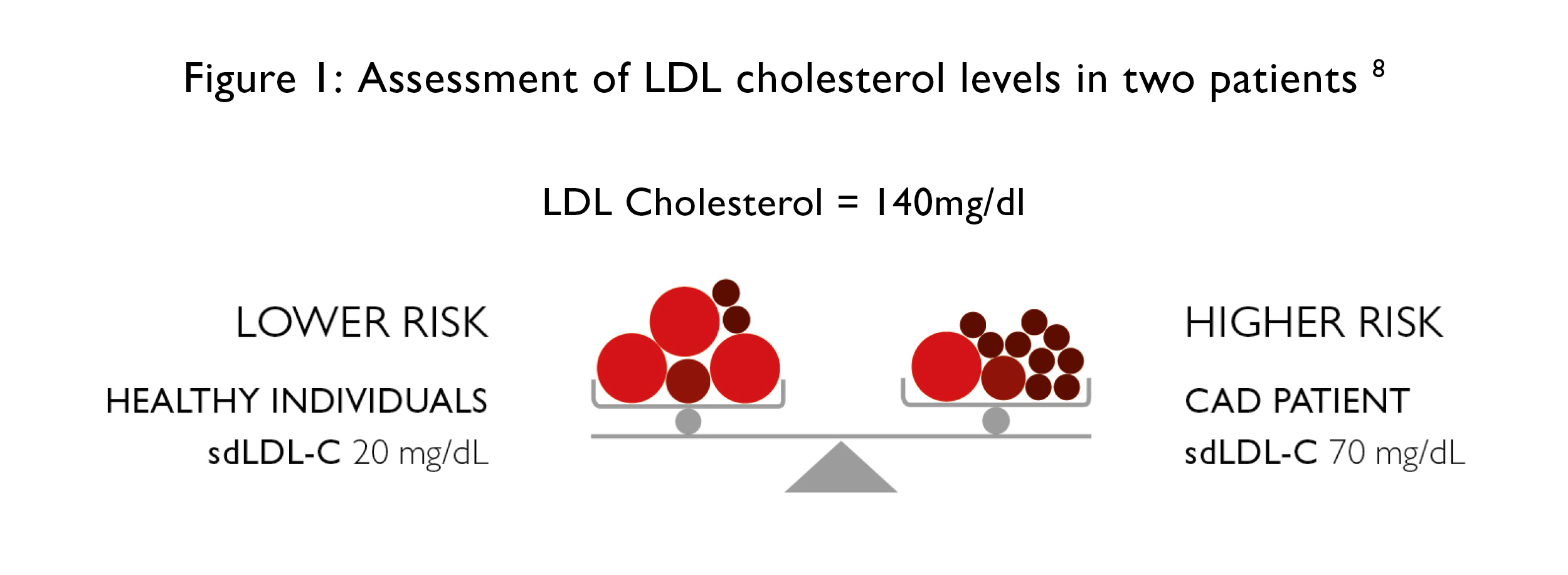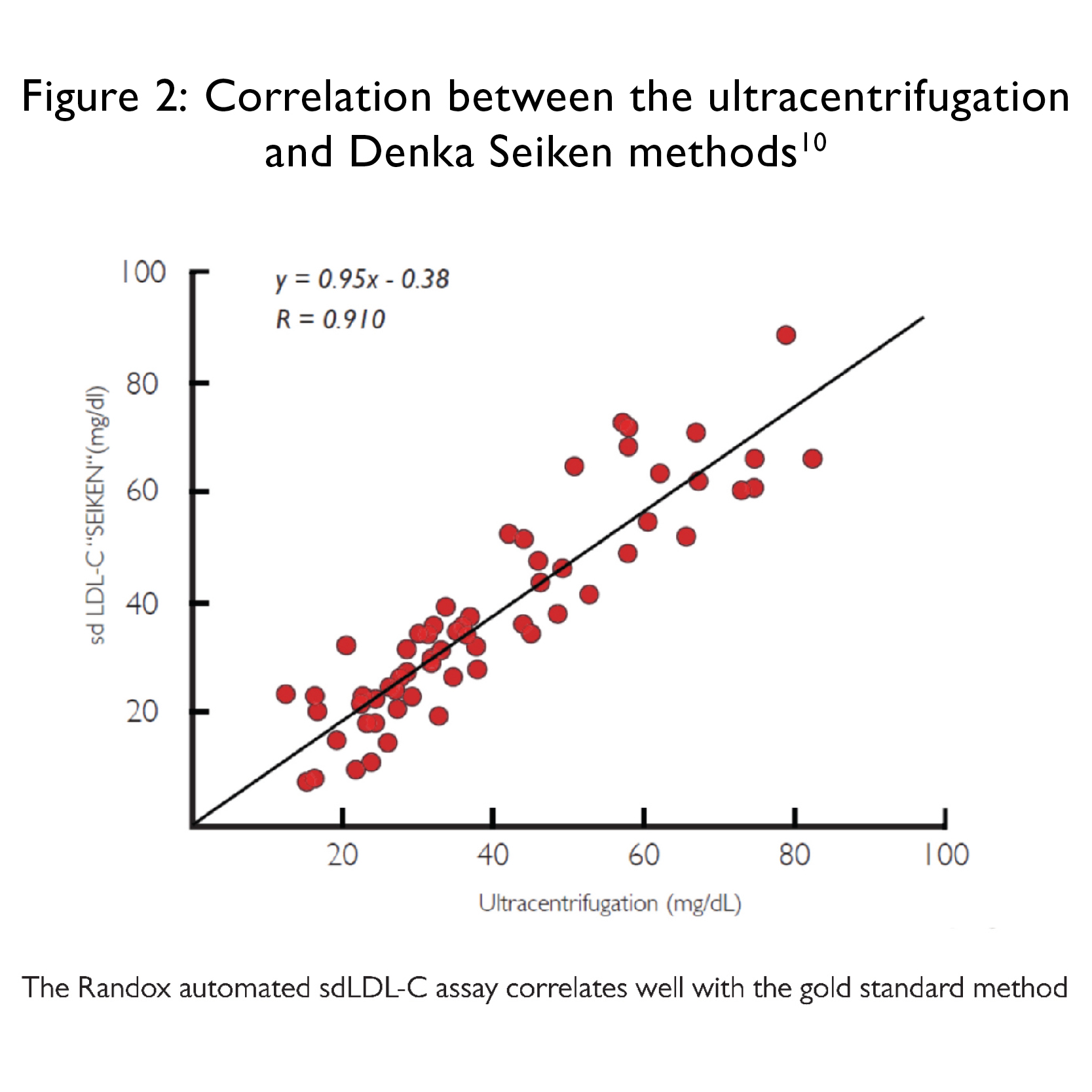Randox Unveils an Assay for the Rapid Measurement of Small Dense LDL Cholesterol (sdLDL-C)
|
By LabMedica International staff writers Posted on 13 May 2019 |

Assessment of LDL cholesterol levels in two patients (Photo courtesy of Randox).

Correlation between the ultracentrifugation and Denka Seiken methods (Photo courtesy of Randox).
A kit for the automated measurement of small dense low-density lipoprotein cholesterol (sdLDL-C) is now available with dedicated controls and calibrators available and instrument-specific applications for use with a wide range of biochemistry analyzers.
The lipid panel often used to assess cardiovascular disease risk comprises LDL cholesterol, HDL cholesterol, total cholesterol, and triglycerides. Results of these assays only detect about 20% of all atherosclerotic cardiovascular disease patients. However, studies have shown that sdLDL-C could predict risk of coronary heart disease in individuals considered being at low cardiovascular risk based on their LDL-C levels. These studies found that patients with a predominance of sdLDL-C had a three-fold increased risk of myocardial infarction (MI), while the relative risk was 4.5 for coronary artery disease and 7.0 for MI when sdLDL-C levels were greater than 100 milligrams per deciliter.
Until recently, the primary methods for determining a patient's sdLDL-C levels were based on laborious and time-consuming ultracentrifugation and electrophoresis. Then, in November 2017, the [U.S.] Food and Drug Administration granted 510(k) marketing clearance to Denka Seiken (Tokyo, Japan) for a small dense low-density lipoprotein cholesterol (sdLDL-C) assay designed for use on any standard clinical chemistry analyzer. The assay quantified sdLDL-C in serum and plasma samples in 10 minutes using a two-step process. The first step removed chylomicrons, very low LDL, intermediate-density lipoprotein, large LDL, and high-density lipoprotein using a surfactant and sphingomyelinase. In the second step, a specific surfactant released cholesterol only from the sdLDL-C particles for measurement by standard methods.
The Randox (Crumlin, United Kingdom) sdLDL-C assay utilizes the Denka Seiken method, providing accurate patient results. It was designed for use on automated biochemistry analyzers for efficiency and convenience. Applications are available detailing instrument-specific settings for the convenient use of the Randox sdLDL-C assay on a wide range of biochemistry analyzers. Dedicated sdLDL-C controls and calibrator are available providing a complete testing package. The Randox sdLDL-C assay is a niche product, and Randox is one of the only manufacturers of this test in an automated format.
The lipid panel often used to assess cardiovascular disease risk comprises LDL cholesterol, HDL cholesterol, total cholesterol, and triglycerides. Results of these assays only detect about 20% of all atherosclerotic cardiovascular disease patients. However, studies have shown that sdLDL-C could predict risk of coronary heart disease in individuals considered being at low cardiovascular risk based on their LDL-C levels. These studies found that patients with a predominance of sdLDL-C had a three-fold increased risk of myocardial infarction (MI), while the relative risk was 4.5 for coronary artery disease and 7.0 for MI when sdLDL-C levels were greater than 100 milligrams per deciliter.
Until recently, the primary methods for determining a patient's sdLDL-C levels were based on laborious and time-consuming ultracentrifugation and electrophoresis. Then, in November 2017, the [U.S.] Food and Drug Administration granted 510(k) marketing clearance to Denka Seiken (Tokyo, Japan) for a small dense low-density lipoprotein cholesterol (sdLDL-C) assay designed for use on any standard clinical chemistry analyzer. The assay quantified sdLDL-C in serum and plasma samples in 10 minutes using a two-step process. The first step removed chylomicrons, very low LDL, intermediate-density lipoprotein, large LDL, and high-density lipoprotein using a surfactant and sphingomyelinase. In the second step, a specific surfactant released cholesterol only from the sdLDL-C particles for measurement by standard methods.
The Randox (Crumlin, United Kingdom) sdLDL-C assay utilizes the Denka Seiken method, providing accurate patient results. It was designed for use on automated biochemistry analyzers for efficiency and convenience. Applications are available detailing instrument-specific settings for the convenient use of the Randox sdLDL-C assay on a wide range of biochemistry analyzers. Dedicated sdLDL-C controls and calibrator are available providing a complete testing package. The Randox sdLDL-C assay is a niche product, and Randox is one of the only manufacturers of this test in an automated format.
Latest Technology News
- New Diagnostic System Achieves PCR Testing Accuracy
- DNA Biosensor Enables Early Diagnosis of Cervical Cancer
- Self-Heating Microfluidic Devices Can Detect Diseases in Tiny Blood or Fluid Samples
- Breakthrough in Diagnostic Technology Could Make On-The-Spot Testing Widely Accessible
- First of Its Kind Technology Detects Glucose in Human Saliva
- Electrochemical Device Identifies People at Higher Risk for Osteoporosis Using Single Blood Drop
- Novel Noninvasive Test Detects Malaria Infection without Blood Sample
- Portable Optofluidic Sensing Devices Could Simultaneously Perform Variety of Medical Tests
- Point-of-Care Software Solution Helps Manage Disparate POCT Scenarios across Patient Testing Locations
- Electronic Biosensor Detects Biomarkers in Whole Blood Samples without Addition of Reagents
- Breakthrough Test Detects Biological Markers Related to Wider Variety of Cancers
- Rapid POC Sensing Kit to Determine Gut Health from Blood Serum and Stool Samples
- Device Converts Smartphone into Fluorescence Microscope for Just USD 50
- Wi-Fi Enabled Handheld Tube Reader Designed for Easy Portability
Channels
Molecular Diagnostics
view channel
Novel Biomarkers to Improve Diagnosis of Renal Cell Carcinoma Subtypes
Renal cell carcinomas (RCCs) are notably diverse, encompassing over 20 distinct subtypes and generally categorized into clear cell and non-clear cell types; around 20% of all RCCs fall into the non-clear... Read more
RNA-Powered Molecular Test to Help Combat Early-Age Onset Colorectal Cancer
Colorectal cancer (CRC) ranks as the second most lethal cancer in the United States. Nevertheless, many Americans eligible for screening do not undergo testing due to limited access or reluctance towards... Read moreHematology
view channel
Next Generation Instrument Screens for Hemoglobin Disorders in Newborns
Hemoglobinopathies, the most widespread inherited conditions globally, affect about 7% of the population as carriers, with 2.7% of newborns being born with these conditions. The spectrum of clinical manifestations... Read more
First 4-in-1 Nucleic Acid Test for Arbovirus Screening to Reduce Risk of Transfusion-Transmitted Infections
Arboviruses represent an emerging global health threat, exacerbated by climate change and increased international travel that is facilitating their spread across new regions. Chikungunya, dengue, West... Read more
POC Finger-Prick Blood Test Determines Risk of Neutropenic Sepsis in Patients Undergoing Chemotherapy
Neutropenia, a decrease in neutrophils (a type of white blood cell crucial for fighting infections), is a frequent side effect of certain cancer treatments. This condition elevates the risk of infections,... Read more
First Affordable and Rapid Test for Beta Thalassemia Demonstrates 99% Diagnostic Accuracy
Hemoglobin disorders rank as some of the most prevalent monogenic diseases globally. Among various hemoglobin disorders, beta thalassemia, a hereditary blood disorder, affects about 1.5% of the world's... Read moreImmunology
view channel
Diagnostic Blood Test for Cellular Rejection after Organ Transplant Could Replace Surgical Biopsies
Transplanted organs constantly face the risk of being rejected by the recipient's immune system which differentiates self from non-self using T cells and B cells. T cells are commonly associated with acute... Read more
AI Tool Precisely Matches Cancer Drugs to Patients Using Information from Each Tumor Cell
Current strategies for matching cancer patients with specific treatments often depend on bulk sequencing of tumor DNA and RNA, which provides an average profile from all cells within a tumor sample.... Read more
Genetic Testing Combined With Personalized Drug Screening On Tumor Samples to Revolutionize Cancer Treatment
Cancer treatment typically adheres to a standard of care—established, statistically validated regimens that are effective for the majority of patients. However, the disease’s inherent variability means... Read moreMicrobiology
view channel
Integrated Solution Ushers New Era of Automated Tuberculosis Testing
Tuberculosis (TB) is responsible for 1.3 million deaths every year, positioning it as one of the top killers globally due to a single infectious agent. In 2022, around 10.6 million people were diagnosed... Read more
Automated Sepsis Test System Enables Rapid Diagnosis for Patients with Severe Bloodstream Infections
Sepsis affects up to 50 million people globally each year, with bacteraemia, formerly known as blood poisoning, being a major cause. In the United States alone, approximately two million individuals are... Read moreEnhanced Rapid Syndromic Molecular Diagnostic Solution Detects Broad Range of Infectious Diseases
GenMark Diagnostics (Carlsbad, CA, USA), a member of the Roche Group (Basel, Switzerland), has rebranded its ePlex® system as the cobas eplex system. This rebranding under the globally renowned cobas name... Read more
Clinical Decision Support Software a Game-Changer in Antimicrobial Resistance Battle
Antimicrobial resistance (AMR) is a serious global public health concern that claims millions of lives every year. It primarily results from the inappropriate and excessive use of antibiotics, which reduces... Read morePathology
view channelHyperspectral Dark-Field Microscopy Enables Rapid and Accurate Identification of Cancerous Tissues
Breast cancer remains a major cause of cancer-related mortality among women. Breast-conserving surgery (BCS), also known as lumpectomy, is the removal of the cancerous lump and a small margin of surrounding tissue.... Read more
AI Advancements Enable Leap into 3D Pathology
Human tissue is complex, intricate, and naturally three-dimensional. However, the thin two-dimensional tissue slices commonly used by pathologists to diagnose diseases provide only a limited view of the... Read more
New Blood Test Device Modeled on Leeches to Help Diagnose Malaria
Many individuals have a fear of needles, making the experience of having blood drawn from their arm particularly distressing. An alternative method involves taking blood from the fingertip or earlobe,... Read more
Robotic Blood Drawing Device to Revolutionize Sample Collection for Diagnostic Testing
Blood drawing is performed billions of times each year worldwide, playing a critical role in diagnostic procedures. Despite its importance, clinical laboratories are dealing with significant staff shortages,... Read moreTechnology
view channel
New Diagnostic System Achieves PCR Testing Accuracy
While PCR tests are the gold standard of accuracy for virology testing, they come with limitations such as complexity, the need for skilled lab operators, and longer result times. They also require complex... Read more
DNA Biosensor Enables Early Diagnosis of Cervical Cancer
Molybdenum disulfide (MoS2), recognized for its potential to form two-dimensional nanosheets like graphene, is a material that's increasingly catching the eye of the scientific community.... Read more
Self-Heating Microfluidic Devices Can Detect Diseases in Tiny Blood or Fluid Samples
Microfluidics, which are miniature devices that control the flow of liquids and facilitate chemical reactions, play a key role in disease detection from small samples of blood or other fluids.... Read more
Breakthrough in Diagnostic Technology Could Make On-The-Spot Testing Widely Accessible
Home testing gained significant importance during the COVID-19 pandemic, yet the availability of rapid tests is limited, and most of them can only drive one liquid across the strip, leading to continued... Read moreIndustry
view channel
Danaher and Johns Hopkins University Collaborate to Improve Neurological Diagnosis
Unlike severe traumatic brain injury (TBI), mild TBI often does not show clear correlations with abnormalities detected through head computed tomography (CT) scans. Consequently, there is a pressing need... Read more
Beckman Coulter and MeMed Expand Host Immune Response Diagnostics Partnership
Beckman Coulter Diagnostics (Brea, CA, USA) and MeMed BV (Haifa, Israel) have expanded their host immune response diagnostics partnership. Beckman Coulter is now an authorized distributor of the MeMed... Read more_1.jpg)














